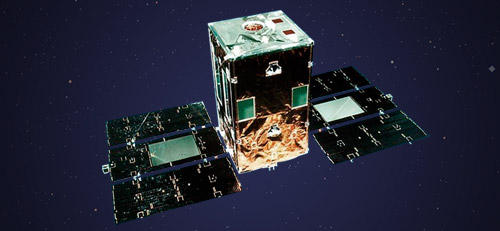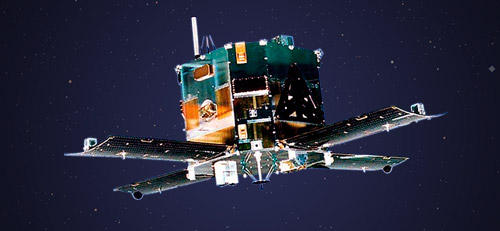| Name (pre-launch in parentheses) | HITEN (MUSES-A) |
|---|---|
| International Designation code | 1990-007A |
| Objectives | 1.Learning of technologies concerning precise determination and control of satellite orbit, and highly-efficient data transmission 2.Experiment of lunar swing-by 3.Experiment of aero braking using the earth 4.Insertion of satellite into orbit around the Moon 5.Measurement of cosmic dust between earth and Moon (joint research with Munich Technical University) |
| Launch Date | 20:46, January 24, 1990 (JST) |
| Launch Location | Kagoshima Space Center (Uchinoura) |
| Launch Vehicle | M-3SII-5 |
| Weight | 197 kg (including lunar orbiting grandchild satellite) |
| Dimensions | Cylinder, 1.4m in diameter and 79cm high Installed the lunar-orbiting grandchild satellite HAGOROMO, 26-hedron, approx. 11kg in weight, 40cm long from face to face |
| Orbit Altitude | Perigee 262 km, Apogee 28,600 km |
| Orbit Inclination | 31° |
| Type of orbit | Double lunar swing-by |
| Period | 6.7 days |
| Scientific Instruments | Dust counter (MDC) Optical navigation system (world-first for a spin-stabilizing satellite) |
| End of Operation | April 11, 1993 |
| Operation | April 11, 1993 (lunar surface) |
| Results | Thirty-four minutes after launch, satellite rotation was slowed to about 25 rpm and its spin axis was set to be perpendicular to the direction of the Sun, thus completing operation to put HITEN into highly elliptical orbit. It successfully conducted up to 10 lunar swing-by experiments and aero-brake experiments by the earth's atmosphere at an altitude of 120km. The satellite also marked its highest apogee altitude of maximum 1,350,000 km. At 5:4:9 on March 19, 1990, HITEN approached about 16,500km from the Moon. The grandchild satellite, which was released just before the approach and put into orbit around the Moon, was named HAGOROMO. In February 1992, HITEN entered lunar orbit also. After completing its mission in 1993, the satellite hit the Furnerius Crater of the Moon on April 11, 1993. |



